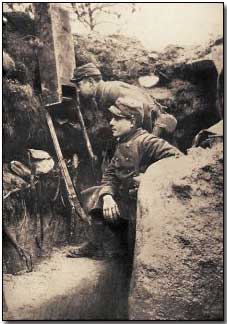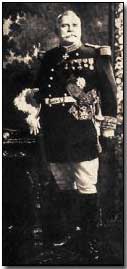Battles - The Battle of Mulhouse, 1914

The Battle of Mulhouse, one of the August Battles of the Frontiers, comprised the opening French attack of the war, and began at 05:00 on 7 August 1914.
Forming a fundamental component of France war strategy, Plan XVII, the Battle of Mulhouse was intended to secure the recapture of Alsace (with Lorraine to follow separately), territories lost to Germany as a consequence of losing the Franco-Prussian War of 1870-71.
Aside from the matter of national pride inherent in the capture of Alsace, French troops there would be well placed to guard the flank of subsequent French invasions further north.
In command of the operation to take Mulhouse was General Bonneau, and he was assigned a detachment of the First Army, plus one cavalry and two infantry divisions Ranged against him was the German Seventh Army under General von Heeringen.
Having crossed the frontier on the morning of 7 August, the French quickly seized the border town of Altkirch with a bayonet charge However Bonneau, suspicious of the light state of the German defences, was wary of advancing much further for fear of stepping into a carefully lain German trap However, under orders to move to the Rhine next day, Bonneau continued his advance, taking Mulhouse shortly after its German occupants had left the town.
 The taking of Mulhouse, albeit without opposition, sparked wild celebrations in France The French were regarded as liberators by the inhabitants of Mulhouse itself.
The taking of Mulhouse, albeit without opposition, sparked wild celebrations in France The French were regarded as liberators by the inhabitants of Mulhouse itself.
However, with the arrival of German reserves from Strasbourg, the Germans mounted a counter-attack on the morning of 9 August at nearby Cernay.
In the absence of reserves of his own, and unable to mount a concentrated defence, Bonneau began a slow withdrawal the same day.
Joseph Joffre, the French Commander-in-Chief, hastily despatched a reserve division to assist in the defence, but they arrived too late to save the town from recapture, Bonneau withdrawing towards Belfort on 10 August in order to escape German encirclement.
Joffre's response was immediate Charging Bonneau with a lack of aggression, he was promptly relieved of command Recognising the high profile of the loss, Joffre added four more divisions to the so-called 'Army of Alsace' placed under the command of General Pau, which unsuccessfully advanced upon Lorraine later that month.
Click here to view a map of the Battle of the Frontiers.
Photographs courtesy of Photos of the Great War website
The British Army suffered 188,706 gas attack casualties during the war of which 6,062 were fatal. The German Army suffered 200,000 gas casualties, 9,000 of which were fatal.
- Did you know?
